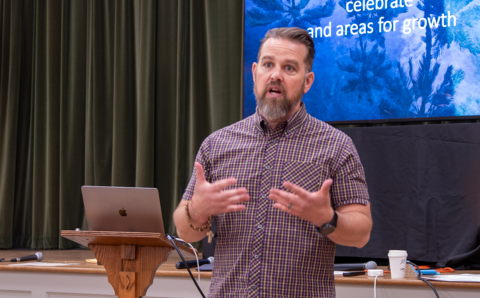I had a good laugh recently when I learned that one of my teenagers was peppering her teacher with unwelcome “whys” about mathematical formulas and theorems. When worn down by their pupils’ questions, even the most patient pedagogues will eventually concede: “Because they are!” For a person like me, whose math skills are subpar, that answer works—but it doesn’t work for everyone.
A big question on the minds of many Christian Reformed folks these days is a similar “why.” Why be part of the CRC denomination? As our North American culture has become more individualistic and anti-institutional, the case for being part of a denomination—or any collective organization—has weakened. Over the next few months, senior leaders in the CRCNA want to share a few answers to that question that go beyond “Just because.”
Our humble Church Order gives four reasons for the existence of classis (regional assemblies of CRCs), and those same four reasons apply to our denominational existence. We are a community of churches that has chosen to do ministry together, and Church Order Article 39 spells out four good reasons for that.
The first reason is that our relationship to each other allows us “to seek, discern, and submit to God’s will.”
A biblical example of this kind of collective discernment and submission is Acts 15:1-35. As Gentiles converted to faith in Jesus, the first question facing the church was whether or not they should be required to follow Jewish ceremonial laws, such as circumcision. Along with their amazing report of God’s work among the Gentiles of Asia Minor, Paul and Barnabas submitted this question to the apostles in Jerusalem.
What happened next is interesting. First, the apostles prayerfully listened to and reflected on the experiences of Paul, Barnabas, Peter, and others with Gentile converts. Second, they devoted considerable attention to the Scriptural prophecies about the Gentiles and the requirements of the Law.
Out of this deliberation came a decision: Gentiles need not be bound by ceremonial laws except for the commands not to eat the meat of strangled animals, the blood of animals, or the meat of animals sacrificed to idols (Lev. 17). The council also reminded the Gentile believers to avoid the ubiquitous sexual immorality that characterized the surrounding Greco-Roman culture.
These 35 verses in Acts were a turning point in the history of the church. The Jerusalem Council sought, discerned, and submitted to God’s will together. As a result, the way opened for God’s mission to the Gentiles.
This process was not without its hurdles. Some early Christians vehemently disagreed with the decision. As New Testament writings attest, the issues addressed by the Council remained divisive wedges (see 1 Cor. 8:7-13, 1 Cor. 10:14-28, and Rev. 2:24 for ongoing coverage of this debate). And many in the “Judaizing” wing of the church remained dissatisfied with the positioning of the Jewish ceremonial laws in the lives of Gentile converts. Yet, together, the church found a way forward that was faithful to the Word of God and the work of the Spirit.
In today’s contentious and quickly changing culture, collectively seeking, discerning, and submitting to God’s will remains essential for our churches. This collective discernment is the work of our church councils, classes, and synod. Collective discernment also happens through those we appoint to serve in our educational institutions and ministry agencies. This kind of collective discernment fulfills God’s encouragement to “trust in the Lord with all your heart and lean not on your own understanding; in all your ways submit to him, and he will make your paths straight” (Prov. 3:5-6).
Yet we acknowledge that our denomination’s collective discernment is currently being contested. As in Paul’s day, there is sharp disagreement in our churches about our corporate decisions. This is as heartbreaking today as it was for the church then. We also recognize that some of our past decisions have been less than perfect and require ongoing discernment. However, even with our imperfections in mind, the biblical model of collective discernment is a good reason to be part of a denomination. On our own, our ability to see the big picture is limited. Together, we gain greater insight and can better seek and discern what God’s will is.
In the next few issues, the View From Here column will share other reasons for being a denomination. If you’d like to participate in the conversation, I invite you to visit the Network (crcna.org/Network), where we hope to share concrete examples of each of these reasons.
About the Author
Rev. Zachary King is the general secretary of the CRCNA. He is a member of Cascade Fellowship Christian Reformed Church in Grand Rapids, Mich.









